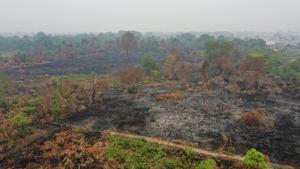 This aerial picture shows smoldering peatland after a fire swept through the area in Kampar, Riau province on Sept 13, 2019. Illegal fires to clear land for farming are raging on Indonesia's Sumatra and Borneo islands with firefighters battling round the clock through charred forests, and water-bombing helicopters deployed to douse the flames. (ADEK BERRY / AFP)
This aerial picture shows smoldering peatland after a fire swept through the area in Kampar, Riau province on Sept 13, 2019. Illegal fires to clear land for farming are raging on Indonesia's Sumatra and Borneo islands with firefighters battling round the clock through charred forests, and water-bombing helicopters deployed to douse the flames. (ADEK BERRY / AFP)
One hundred countries, representing 85 percent of the world’s forests, have given themselves nine years to halt and reverse deforestation, in a major new commitment at global climate change talks on Tuesday.
Brazil, Russia, Canada, Colombia and Indonesia will be among the nations committing to halt and reverse forest loss and land degradation by 2030 at the third day of COP26 in Glasgow, Scotland, in an initiative spearheaded by the conference host, the UK.
The inclusion of Brazil, home to the world’s largest tropical rainforest, is crucial to the initiative and comes amid a turnaround in the country’s ambitions to reduce emissions and tackle deforestation. Across the world as a whole, an area of forest the size of 27 soccer pitches is lost every minute, according to the UK.
It’s central to the ambition of COP26 that we act now and we end the role of humanity as nature’s conqueror, and instead become nature’s custodian.
Boris Johnson, UK PM
The international pledge will be backed by $19.2 billion (about 14 billion pounds) in funding, the UK. said. However, only $7.2 billion of that will be new money, coming from companies and philanthropies and will go to encouraging deforestation-free soy and cattle production in South America, and to scale investments in tree planting and other nature-based solutions.
In addition to the private funding, 12 countries including the UK will allocate $12 billion (8.75 billion pounds) of public funds from 2021 through 2025 to tackle wildfires, restore land and help indigenous communities. These contributions will mostly come from existing financial commitments, according to a spokeswoman from the UK government.
It’s central to the ambition of COP26 “that we act now and we end the role of humanity as nature’s conqueror, and instead become nature’s custodian,” UK Prime Minister Boris Johnson said Tuesday in Glasgow.
ALSO READ: Winners of 'Green Nobel' fight deforestation, coal power
“We have to stop the devastating loss of our forests, these great teeming ecosystems – three-trillion-pillared cathedrals of nature – that are the lungs of our planet,” he said.
 A cattle farm scorched by wildfires in Porto Velho, Rondonia state, Brazil, Aug 23, 2019. (PHOTO / BLOOMBERG)
A cattle farm scorched by wildfires in Porto Velho, Rondonia state, Brazil, Aug 23, 2019. (PHOTO / BLOOMBERG)
The list of 100 countries, from Albania to Zimbabwe, includes the Democratic Republic of the Congo and nearby countries that are home to the second-largest tropical rainforest, as well as economic heavyweights the US and China.
Forestry experts welcomed the announcement cautiously, because previous similar pledges have failed to deliver. The New York Declaration on Forests in 2014, also contained a commitment to end deforestation by 2030. A progress report last month found signatories had not embedded the goals into their domestic policies.
READ MORE: Rapid urbanization, deforestation in Asia linked to deadly viruses
“Halting deforestation has been promised before but failed hugely,” said Professor Alexandre Antonelli, Director of Science at the Royal Botanic Gardens, Kew, in London. “What we need now is delivery, and enough details to hold our leaders to account.”


